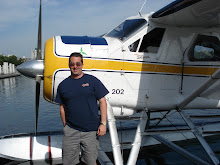David P Davies OBE DSC 1920-2003

Born in Neath, South Wales, in 1920, David Pettit Davies joined the Royal Navy in 1940, serving as a torpedo man and surviving the sinking of the auxiliary fighter catapult ship Patia in May 1941. He then trained as a pilot in the Fleet Air Arm, soloing on a Tiger Moth in 1941, and served in 818 (Swordfish) Squadron on the carrier Unicorn. After action off Norway and Salerno he was posted to 854 (Avenger) Squadron in support of the D-Day landings. He saw service in the Far East on the aircraft carrier Illustrious, flying Avengers off Sumatra and Japan and winning the DSC.
After the war he attended a naval test pilots’ course and the Empire Test Pilots’ School. In August 1949, after three years evaluating the handling of new military aircraft types, he joined the civilian Air Registration Board (now the CAA) as chief test pilot.
It was a busy time for the British civil aircraft industry, which was pioneering the new age of jet and turboprop airliners with the Vickers Viscount, Bristol Britannia and de Havilland Comet. Revisions to British civil airworthiness requirements were needed, especially for the jets. Davies drafted the new rules governing aircraft stability, control, performance and flying qualities. He in fact originated the fundamentally new pilot-handling requirements for the jet age.
He checked all the British and American jetliners which followed the Comet: VC10, Trident, One-Eleven, 707, 727, 737, 747, DC8, DC9, DC10, TriStar, the Airbuses and the supersonic Concorde.
One of his most sensitive jobs was persuading Boeing to modify the 707, which BOAC had ordered for delivery in 1960. He did not like its directional control and wanted a bigger fin and full-time rudder boost. Boeing and the American FAA complied, as 707s and KC135s still flying today bear witness.
Boeing also agreed with his insistence that British-registered 727s should have automatic stick-pushers to protect the average airline pilot from the “superstall”, a flaw endemic in T-tailed rear-engined aircraft. Davies had previously had stickpushers fitted to the BAC One-Eleven and Hawker Siddeley Trident, British T-tailers which had killed test crews in superstalls. Davies remembered Trident stalling as the most demanding flying of his career.
He had his share of hairy moments, especially when evaluating stalls. During a Britannia stalling test in the 1950s, the big four-engined transport suddenly flick-rolled and went into a spin. He recalled: “It recovered beautifully — which Bristol claimed was grounds for not complaining!” On the way home, “wondering why we’d ever joined in the first place", his flight observer Roy Burdett lit a cigarette for him and said: “How about a loop as an encore?”
Davies declared a later Bristol product, Concorde, to be “a delight to fly”. He always credited his deputy, Gordon Corps, and French colleague Pierre Dudal for certificating Concorde’s flying qualities, though he double-checked the remoter double-failure cases. “Our job was to ensure that Concorde could be flown home from Mach 2 at 60,000ft after a range of double failures such as engines, computers and hydraulics, and landed with no undue skill or strength.” Davies put all his experience — 6,000 hours in 150 types of aircraft — into his classic textbook, Handling the Big Jets. Updated and reprinted many times since 1967, it is the jet pilots’ bible, ever present on the shelves of test pilots, airline training captains, line pilots, and even airline passengers. It deals with a technical subject in the simple, lucid English which he spoke.
He was awarded the Distinguished Service Cross in 1945 and appointed OBE in 1957. He was a Fellow of the Royal Aeronautical Society. Professional honours included the society’s R. P. Alston Memorial prize, the Guild of Air Pilots and Air Navigators Cumberbatch Trophy (he was a master air pilot of the guild), the Society of Licensed Aircraft Engineers Dorothy Spicer Award, the Flight Safety Foundation Technical Publications Award, the Douglas Weightman Safety Award and the Air League Founders’ Medal.


<< Home